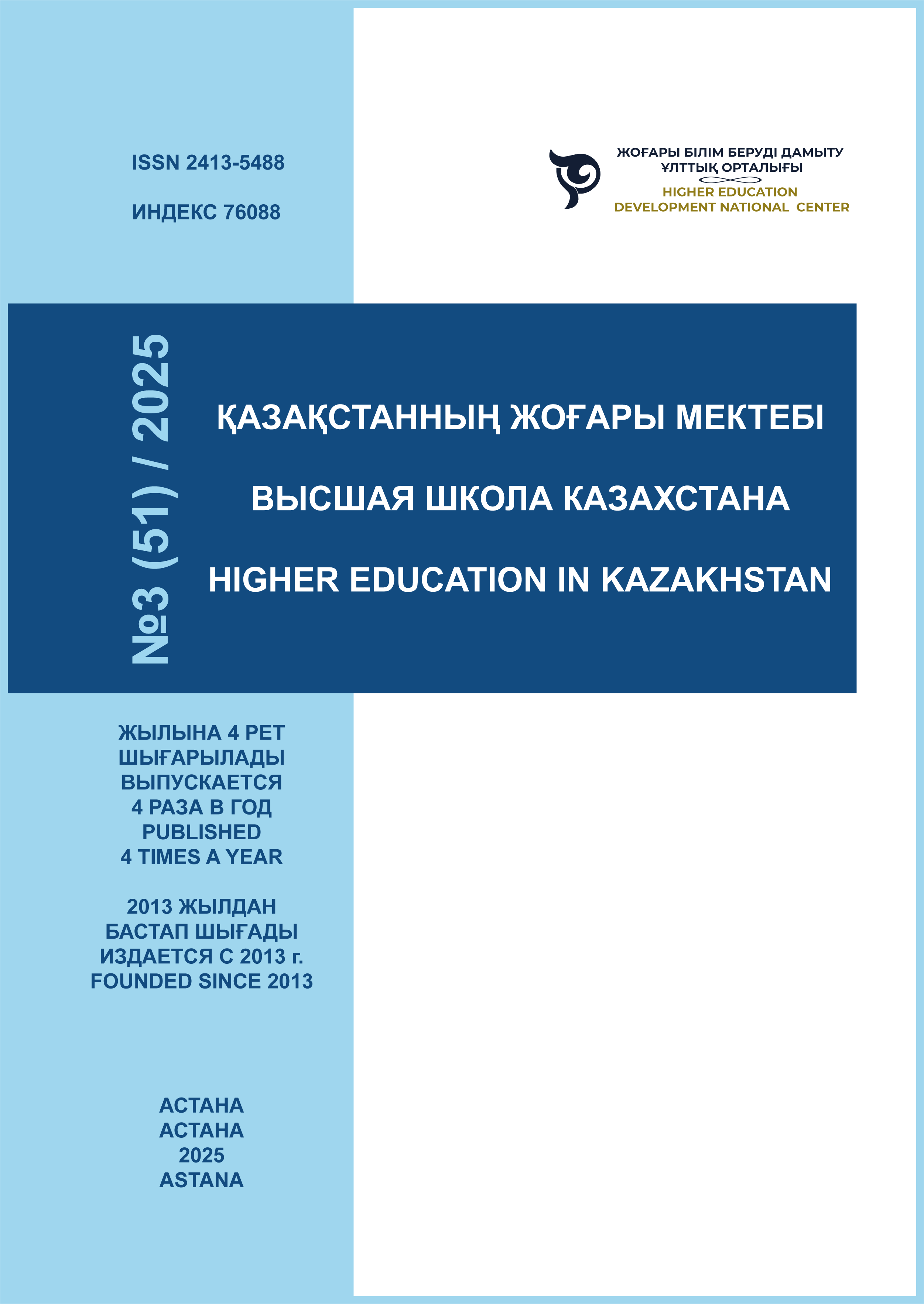DEFINING THE LINGUISTIC MEANS OF SCIENTIFIC AND TECHNICAL COMMUNICATION IN THE TRAINING OF ENGINEERS
DOI:
https://doi.org/10.59787/2413-5488-2025-51-3-74-91Keywords:
linguistic means; scientific communication; training of engineers; theoretical review; questionnaire survey; data analysisAbstract
Changes in the higher education system predetermine the need for scientific understanding of the process of scientific and professional activities formation, which play a key role in the development of knowledge, innovation and solving complex problems in the field of science and technology. The article examines the problem of scientific training of engineers, which lies in the need to substantiate and develop technology for the formation of scientific and professional competence of technical university students in the process of teaching the scientific language, that is, teaching scientific communication in engineering. The authors presented research of scientific and linguistic system of technical personnel training through a theoretical review of foreign experience in order to determine key linguistic means of scientific and technical communication and a questionnaire survey to assess the applicability of linguistic means of scientific discourse in the training of engineering and technical personnel.
The research has been carried out within the framework of the project funded by the Science Committee of the Ministry of Science and Higher Education of the Republic of Kazakhstan “Enhancing Scientific and Professional Language Learning for Engineering Students in Kazakhstan through Digital Technologies” (Grant No. AP19678460).
References
Almazova, N. I., SHul'gina, E. M., Sidorenko, T. V., Serova, T. S., Salekhova, L. L., Baranova, T. A., Vdovina, E. K., Gal'skova, N. D., Krylov, E. G., Minakova, L. YU., Obdalova, O. A., & Rybushkina, S. V. (2018). Integrirovannoe obuchenie inostrannym yazykam i professional'nym disciplinam. Opyt rossijskih vuzov. Elib.spbstu.ru. https://elib.spbstu.ru/dl/2/id18-83.pdf/info
Anke, L. E. (2013). Classifying Different Definitional Styles for Different Users. Procedia - Social and Behavioral Sciences, 95, 267–275. https://doi.org/10.1016/j.sbspro.2013.10.647
Annesley, T. M. (2011). Giving Credit: Citations and References. Clinical Chemistry, 57(1), 14–17. https://doi.org/10.1373/clinchem.2010.158048
APA PsycNet. (n.d.). Psycnet.apa.org. https://psycnet.apa.org/fulltext/2018-00750-002.html
Bajaj, N., Rajwadi, M., Constance, T. G., Wall, J., Moniri, M., Laird, T., Woodruff, C., Laird, J., Glackin, C., & Cannings, N. (2023). Deception detection in conversations using the proximity of linguistic markers. Knowledge-Based Systems, 267, 110422. https://doi.org/10.1016/j.knosys.2023.110422
Beltukova, N.P. (2012). Formirovanie professional'no-orientirovannoj inoyazychnoj kommunikativnoj kompetencii u ekonomistov-bakalavrov. Uchrediteli: Nacional'nyj issledovatel'skij Tomskij gosudarstvennyj universitet https://elibrary.ru/ozlzyp
Bowden, P. R. (1999). Jennifer Pearson. Terms in Context. John Benjamins Publishing Co., Amsterdam. 1998. ISBN 90 272 2269 X (Eur.)/1 55619 342 (US). Natural Language Engineering, 5(4), 395–402. https://doi.org/10.1017/S135132490021231X
Brosche, T. A. M. (2009). Successful Online Learning: Managing the Online Learning Environment Efficiently and Effectively: Managing the Online Learning Environment Efficiently and Effectively. In Google Books. Jones & Bartlett Publishers. http://surl.li/qjkod
Dunaeva, A. S., & Vetchinova, M. N. (2014). Kul'turologicheskaya ideya koncepcii kommunikativnogo inoyazychnogo obrazovaniya. Yazyk i kul'tura, 3 (27)), 138-145.
Fuertes-Olivera, P., & Nielsen, S. (2011). The Dynamics of Terms in Accounting: What the construction of the accounting dictionaries reveals about metaphorical terms in culture-bound subject fields. Terminology, 17, 157-180. https://doi.org/10.1075/term.17.1.09fue
Gladkova, Z. V. (2009). Vidy kommunikacij v sovremennoj nauke. Nauchnyj vestnik Moskovskogo gosudarstvennogo tekhnicheskogo universiteta grazhdanskoj aviacii, (142), 161-163.
Goldbort, R. (2006). Writing for Science. In Google Books. Yale University Press. https://books.google.kz/books?hl=en&lr=&id=HuM1Dm9ejVoC&oi=fnd&pg=PR1&dq=27.%09Robert+Goldbort
Gredina, I.V. (2010). Koncepty nauchnogo diskursa. https://gtmarket.ru/concepts/scientific-concepts
Hyland, K. (2011). Continuum Companion to Discourse Analysis. In Google Books. Bloomsbury Publishing. https://clck.ru/38jvKW
Isakova, L. D. (2013). Lingvisticheskij aspekt nauchnoj kommunikacii. Kognitivno-diskursivnaya paradigma: teoriya i praktika. Tom 4 (664), Seriya «Yazykovedenie»
Kokenova, Z.K. (2012). Realizaciya pyati kompetencij v uchebnom processe po russkomu yazyku dlya studentov-medikov. Kazahskij nacional'nyj medicinskij universitet im. S. D. Asfendiyarova http://surl.li/qjmkl
Kondyurina, I. M. (2018). Obuchenie inoyazychnoj nauchnoj kommunikacii magistrov v neyazyko- vom vuze / I. M. Kondyurina, E. V. Grishina, V. V. Sheveleva. Sociokul'turnoe prostranstvo Rossii i zarubezh'ya: obshchestvo, obrazovanie, yazyk. Vypusk 7, 107—121 https://elar.rsvpu.ru/bitstream/123456789/30211/1/sprz_2018_7_15.pdf
Krutikhina, T. A., Antonov, E. V., & Ionkina, K. V. (2022). The fuzzy objects recognition in scientific and technical papers by means of natural languages processing technologies. Procedia Computer Science, 213, 656–665. https://doi.org/10.1016/j.procs.2022.11.118
Levitt, H. M., Bamberg, M., Creswell, J. W., Frost, D. M., Josselson, R., & Suárez-Orozco, C. (2018). Journal article reporting standards for qualitative primary, qualitative meta-analytic, and mixed methods research in psychology: The APA Publications and Communications Board task force report. American Psychologist, 73(1), 26–46. https://doi.org/10.1037/amp0000151
Mehler, A., & Romary, L. (2012). Handbook of Technical Communication. In Google Books. Walter de Gruyter. http://surl.li/qjlgs
Mikhaylenko, T. D. (2014). Yazykovye aspekty nauchnoy kommunikatsii. Vestnik Rossiyskoy tamozhennoy akademii, 78–83. https://cyberleninka.ru/article/n/yazykovye-aspekty-nauchnoy-kommunikatsii
Mikhaylova, G. I. (2016). Znachimost' yazykovoj kompetentnosti v kontekste professional'noj kompetencii budushchego specialista. Gramota. No 7(61): in 3 parts. Part 1, 192-195. http://www.gramota.net/materials/2/2016/7-1/58.html
M. Jimmie Killingsworth, & Gilbertson, M. K. (2018). Signs, Genres, and Communities in Technical Communication. In Routledge eBooks. https://doi.org/10.4324/9781315223728
Osiyanova, O.M. (2009). Kul'tura rechevogo obshcheniya prepodavatelya kak resurs povysheniya kachestva podgotovki specialista. Dinamika nauchnyh issledovanij, 6. http://www.rusnauka.com/21_DNIS_2009/Pedagogica/49364.doc.htm
Samoylenko, S. G. (2019). Yazykovaya podgotovka kak sostavlyayushchaya sovremennoj strategii professional'noj podgotovki inzhenernyh kadrov. Vestnik Surgutskogo gosudarstvennogo pedagogicheskogo universiteta, 3(60), 171-176. https://cyberleninka.ru/article/n/yazykovaya-podgotovka-kak-sostavlyayuschaya-sovremennoy-strategii-professionalnoy-podgotovki-inzhenernyh-kadrov
Shirokanova, А. А. (2013) Novaya rol' i formy nauchnoj kommunikacii v informacionnuyu epohu https://elib.bsu.by/bitstream/123456789/91941/1/103-116.pdf
Scientific and Operational Requirements for TOMS Data: Proceedings of a Conference Held at NASA Goddard Space Flight Center, Greenbelt, Maryland, September 10-11, 1986. In Google Books. National Aeronautics and Space Administration, Scientific and Technical Information Division. http://surl.li/qjkjc
Taffesse, W., & Kassa, L. (2005). In collaboration with the Ethiopia Public Health Training Initiative, The Carter Center, the Ethiopia Ministry of Health, and. http://sv.20file.org/up1/1112_0.pdf
Talishinski E.B. (2021). Razvitie nauchnoj kommunikacii v usloviyah informatizacii obshchestva. Tezisy dokladov Devyatoj mezhdunarodnoj nauchno-prakticheskoj konferencii, 113-115 https://elibrary.ru/item.asp?id=47224813
Valeev, A. A., & Kondrat’eva, I. G. (2015). Axiological Approach to the Development of Students’ Intercultural Competences by Foreign Language Means. Procedia - Social and Behavioral Sciences, 191, 361–365. https://doi.org/10.1016/j.sbspro.2015.04.377
Xiao, Yuehai. (2011). Academic Discourse: English in a Global Context. Journal of English for Academic Purposes. 10. 198-199. 10.1016/j.jeap.2010.02.009

Downloads
Published
Issue
Section
License
Copyright (c) 2025 Scientific and analytical journal "Higher school of Kazakhstan"

This work is licensed under a Creative Commons Attribution-NonCommercial 4.0 International License.













